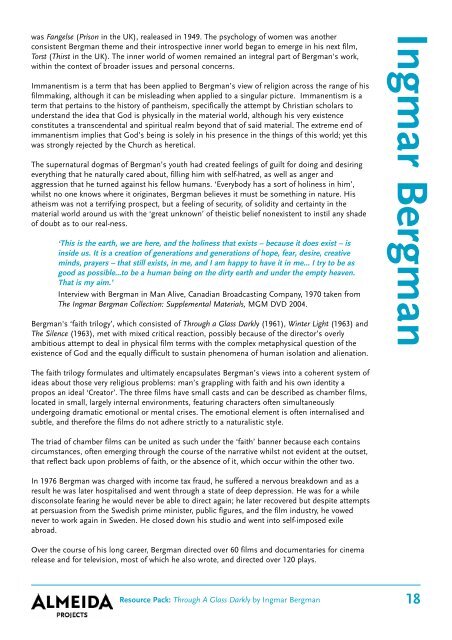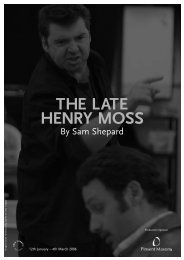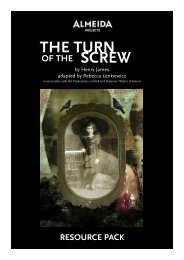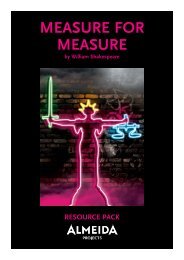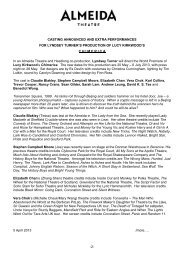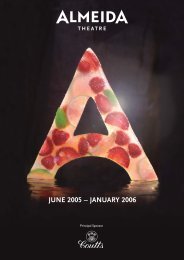Through a Glass Darkly - Almeida Theatre
Through a Glass Darkly - Almeida Theatre
Through a Glass Darkly - Almeida Theatre
- No tags were found...
Create successful ePaper yourself
Turn your PDF publications into a flip-book with our unique Google optimized e-Paper software.
was Fangelse (Prison in the UK), realeased in 1949. The psychology of women was anotherconsistent Bergman theme and their introspective inner world began to emerge in his next film,Torst (Thirst in the UK). The inner world of women remained an integral part of Bergman's work,within the context of broader issues and personal concerns.Immanentism is a term that has been applied to Bergman’s view of religion across the range of hisfilmmaking, although it can be misleading when applied to a singular picture. Immanentism is aterm that pertains to the history of pantheism, specifically the attempt by Christian scholars tounderstand the idea that God is physically in the material world, although his very existenceconstitutes a transcendental and spiritual realm beyond that of said material. The extreme end ofimmanentism implies that God’s being is solely in his presence in the things of this world; yet thiswas strongly rejected by the Church as heretical.The supernatural dogmas of Bergman’s youth had created feelings of guilt for doing and desiringeverything that he naturally cared about, filling him with self-hatred, as well as anger andaggression that he turned against his fellow humans. ‘Everybody has a sort of holiness in him’,whilst no one knows where it originates, Bergman believes it must be something in nature. Hisatheism was not a terrifying prospect, but a feeling of security, of solidity and certainty in thematerial world around us with the ‘great unknown’ of theistic belief nonexistent to instil any shadeof doubt as to our real-ness.‘This is the earth, we are here, and the holiness that exists – because it does exist – isinside us. It is a creation of generations and generations of hope, fear, desire, creativeminds, prayers – that still exists, in me, and I am happy to have it in me… I try to be asgood as possible…to be a human being on the dirty earth and under the empty heaven.That is my aim.’Interview with Bergman in Man Alive, Canadian Broadcasting Company, 1970 taken fromThe Ingmar Bergman Collection: Supplemental Materials, MGM DVD 2004.Bergman's ‘faith trilogy’, which consisted of <strong>Through</strong> a <strong>Glass</strong> <strong>Darkly</strong> (1961), Winter Light (1963) andThe Silence (1963), met with mixed critical reaction, possibly because of the director’s overlyambitious attempt to deal in physical film terms with the complex metaphysical question of theexistence of God and the equally difficult to sustain phenomena of human isolation and alienation.Ingmar BergmanThe faith trilogy formulates and ultimately encapsulates Bergman’s views into a coherent system ofideas about those very religious problems: man’s grappling with faith and his own identity apropos an ideal ‘Creator’. The three films have small casts and can be described as chamber films,located in small, largely internal environments, featuring characters often simultaneouslyundergoing dramatic emotional or mental crises. The emotional element is often internalised andsubtle, and therefore the films do not adhere strictly to a naturalistic style.The triad of chamber films can be united as such under the ‘faith’ banner because each containscircumstances, often emerging through the course of the narrative whilst not evident at the outset,that reflect back upon problems of faith, or the absence of it, which occur within the other two.In 1976 Bergman was charged with income tax fraud, he suffered a nervous breakdown and as aresult he was later hospitalised and went through a state of deep depression. He was for a whiledisconsolate fearing he would never be able to direct again; he later recovered but despite attemptsat persuasion from the Swedish prime minister, public figures, and the film industry, he vowednever to work again in Sweden. He closed down his studio and went into self-imposed exileabroad.Over the course of his long career, Bergman directed over 60 films and documentaries for cinemarelease and for television, most of which he also wrote, and directed over 120 plays.Resource Pack: <strong>Through</strong> A <strong>Glass</strong> <strong>Darkly</strong> by Ingmar Bergman 18


